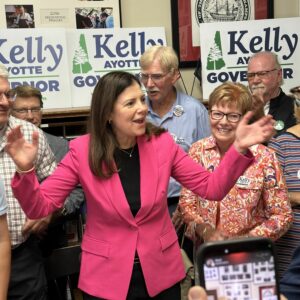For the second time in a week, a poll finds New Hampshire’s Republican primary voters are solidly behind Kelly Ayotte, but utterly undecided about the candidates in the two congressional primaries.
And Democrats are even more divided, without a clear frontrunner in either of their primary races.
The latest Granite State Poll, a States of Opinion Project, conducted by the University of New Hampshire Survey Center, found Ayotte with a massive 44-point lead (65-21 percent) over former state Senate President Chuck Morse (R-Salem). It follows a St. Anselm College Survey Center poll a week earlier giving Ayotte a 34-point lead (59-25 percent).
Veteran pollster David Paleologos of Suffolk University tells NHJournal that margin is all but insurmountable with the Sept. 10 primary less than three weeks away. He declined to offer any specific analysis of the polling by St. Anselm or UNH, but said that as a general rule, “If a candidate is over 50 percent at this point, it’s probably done. Ayotte is over 50 – actually over 60 – so it is highly improbable that she loses unless the polling is way off.”
That’s the conclusion of the Republican Governors Association, which disclosed Wednesday it’s already donated more than $1 million to Ayotte’s campaign. This week’s campaign finance disclosures show Ayotte with $1.76 million cash on hand, compared to Morse’s $750,000.
As big as Ayotte’s lead appears to be, the more surprising numbers may be those from the GOP primaries in the state’s two congressional districts. After months of campaigning by a half-dozen potentially serious contenders, voters don’t appear to know who the candidates are, much less which one they’re supporting.

In the NH-01 GOP primary, former Executive Councilor Russell Prescott has the support of 19 percent of respondents, while Manchester Board of Aldermen Chair Joe Kelly Levasseur is at 1o percent. None of the others broke five percent. But the biggest name by far in the race is “don’t know/undecided” at 60 percent.
Again, that echoes the St. A’s poll, which had Levasseur at 15 percent, Prescott at 10 percent, and 59 percent of voters “unsure.”
Neither of the two top candidates in the NH-02 GOP primary, Vikram Mansharamani or Lily Tang Williams, have been able to break out, either. In the UNH poll, it’s Mansharamani at 21 percent and Williams at 17 percent. In St. A’s, the two were tied at 16 percent.
In both polls, far more GOP primary voters were undecided than supported either candidate.
The UNH poll found around 60 percent — or more — of likely primary voters didn’t know enough about the candidates to have an opinion, a number Paleologos said is “very high” three weeks from an election.

But Andy Smith, director of the UNH Survey Center, said he’s not surprised.
“It’s summertime! Why would people be paying attention to politics when they could be in the mountains or the beach? Things will heat up after Labor Day.”
Veteran New Hampshire political consultant Tom Rath attributed the low name ID to the calendar as well.
“Part of that is because we have an early September primary and folks really don’t pay attention until vacations are over and kids are back in school.”
Labor Day is Sept. 2, leaving just one week until Election Day.
“It almost comes down to that,” Rath conceded.
For Democratic candidates, the picture isn’t quite as unclear, but the races are far from firmed up.

In the primary for governor, the UNH survey gave former Manchester Mayor Joyce Craig a modest 39 to 30 percent lead over Executive Councilor Cinde Warmington. They are the only two candidates in double digits. Undecided is at 23 percent.
In the NH-02 Democratic primary, former Biden administration official Maggie Goodlander leads former Executive Councilor Colin Van Ostern 34 to 28 percent, but both trail “undecided” at 38 percent.
Rath calls it “the most unexpected race. Lots of money being spent here.”
And while Goodlander moved back into the district just a few months ago after more than 15 years away, Rath says her “Tamposi” family name will make a difference, particularly in Nashua.
“Van Ostern has been on the ballot a few times and seems to be stronger in a primary than in the general election. Turnout will matter here.”
Rath is predicting about 30 percent voter turnout, “so getting your voters out will be key.”
Smith sees a similar turnout, in the 20 to 30 percent range, which he calls typical.
Asked about an entire primary campaign compressed into the seven days after Labor Day, Smith’s reply:
“Sprint to the finish!”





